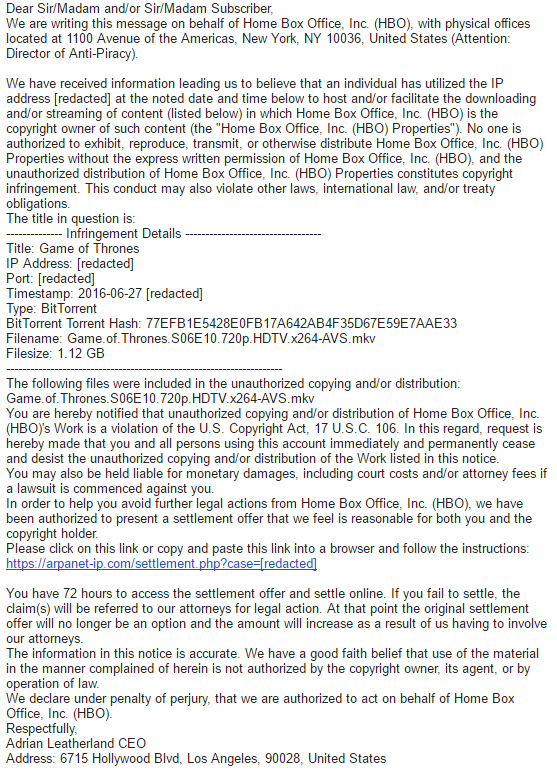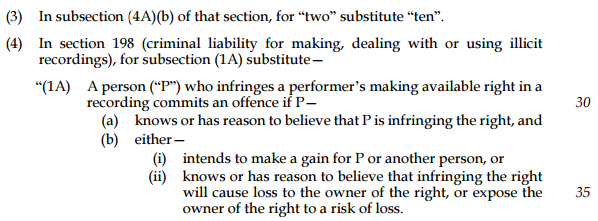Phishing Scam Targets Game of Thrones Pirates
jeudi 7 juillet 2016 à 21:09 Scammers have found a way to exploit copyright infringement notices for their own profit.
Scammers have found a way to exploit copyright infringement notices for their own profit.
Posing as a well-known anti-piracy monitoring outfit representing major movie and TV companies, they’re sending numerous takedown notices to Internet providers.
We first noticed the phishing scam last month when a Cox subscriber was targeted, but at the time it was unclear how significant it was.
Since then, we have learned that the phishing expedition is not limited to the United States. Also, the scammers are actively targeting a variety of alleged movie and TV-show pirates.
Employees at several ISPs have contacted TorrentFreak with additional information over the past several weeks. This detail shows that the scheme is much broader than previously thought.
The notices in question are not being exclusively sent to U.S. ISPs. Internet providers in the UK and Australia have also received similar notifications. While some ISPs realize that it’s a scam, others have forwarded the notices to their customers.
After our first report the imposters changed the domain name they’re using to collect the settlements. In addition, they also began targeting other content including the season finale of HBO’s Game of Thrones.

In a professionally worded email, the account holder connected to an IP-address is accused of downloading a pirated copy of the popular TV show. If the recipient fails to settle the case for a few hundred dollars, the fake HBO says it might take legal action.
“You have 72 hours to access the settlement offer and settle online. If you fail to settle, the claim(s) will be referred to our attorneys for legal action. At that point the original settlement offer will no longer be an option and the amount will increase as a result of us having to involve our attorneys,” they write.
The emails are causing confusion at some ISPs as HBO and its piracy monitoring firm IP-Echelon do send takedown notices to Game of Thrones pirates. However, they have nothing to do with the threatening settlement requests.
“The notices are fake and not sent by us. It’s a phishing scam,” IP-Echelon informed TorrentFreak previously.
TorrentFreak spoke to an employee at a datacenter that was targeted by the phishing scam. The notices in question raised suspicion as not all reported IP-addresses were part of their network, but other than that they appeared to be real.
“They seemed believable at first because they were sending notices about customers who we are accustomed to seeing a high volume of torrenting complaints about,” the employee informed us.
Interestingly, this also suggests that the notices are not being sent to random addresses, and it may very well be that the scammers are scraping the IPs from real torrent swarms.
“We have a few VPN providers on our network and they get a lot of complaints from the real IP Echelon. At first I thought IP Echelon renamed their service or got bought out. I do think they are monitoring P2P networks, not just making these up out of thin air,” the datacenter employee adds.
TorrentFreak approached HBO for additional information about the issue but the company did not respond to our inquiry. Other rightsholders which are being faked, including Lionsgate and Warner Bros, are also yet to comment.
According to IP-Echelon, U.S. law enforcement is currently looking into the matter. However, tracking down the source of phishing operations is usually quite hard.
In the meantime, both ISPs and subscribers should be extra cautious.
Source: TF, for the latest info on copyright, file-sharing, torrent sites and ANONYMOUS VPN services.

 The Federation Against Copyright Theft is perhaps the most well-known anti-piracy group in the UK and it regularly makes headlines for its work tackling both on-and-offline infringement.
The Federation Against Copyright Theft is perhaps the most well-known anti-piracy group in the UK and it regularly makes headlines for its work tackling both on-and-offline infringement.
 Last year the UK Government announced a plan to increase the maximum prison sentence for online copyright infringement
Last year the UK Government announced a plan to increase the maximum prison sentence for online copyright infringement 
